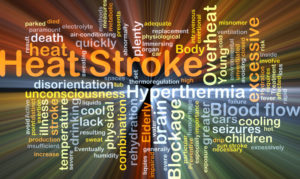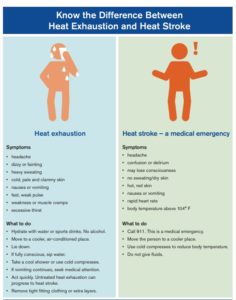In the wintertime in Canada, people often dream of what they’ll do when it gets hot again. Some even travel for shorter or longer periods of time to warmer climates to wait out the cold weather . But as enjoyable as hot weather is, sometimes it can get a little too warm for our bodies and that’s when health issues can pop up.
The way humans react to heat can vary. In some cases, hot temperatures can cause heat intolerance – that’s when your body becomes overheated due to a rise in the temperature in the environment around you. In other more severe cases, extreme heat can also lead to heat illness, like heat cramps, heat exhaustion, and heat stroke. They are degrees of your body’s response to an overexposure to heat, especially in the spring when we transition, sometimes abruptly, from winter to spring. In Toronto, we go actually from winter straight to summer now!
The body reacts so poorly to hot weather because, well, we just weren’t made to endure extreme heat. “Our bodies are designed to be at a constant temperature; we are called ‘homeotherms,'” Erik D. Axene, MD, an emergency physician at Envision Healthcare”. For this reason, our bodies’ regulatory systems must maintain this constant, optimal temperature of around 37 degrees Celsius, which is crucial to our internal systems. Unfortunately, when various health conditions or environmental extremes hamper our regulatory systems, we can overheat or become hyperthermic.

One first degree of this dis-regulation of the temperature control of our bodies is called Heat Intolerance. The most common sign of heat intolerance is increased sweating. This usually comes first. Other signs of heat intolerance are:
- Increased sweating
- Light-headedness
- Headache
- Excessive fatigue (weakness)
- Rapid breathing
- Increased heart rate
- Nausea
- Decreased concentration
If you’re suffering from heat intolerance, you may feel overheated, but others around you in a similar environment don’t feel the same.
Next in severity comes Heat exhaustion. It is less severe than heat stroke (the next stage) and can develop after several day of exposure to hot temperatures and inadequate fluid intake. The body’s temperature is usually above 38.0 C.
If you’re able to cool down within 30 minutes, heat exhaustion isn’t typically considered an emergency.
But if you’re unable to lower your body temperature or if you experience any of the following symptoms, you should call 911 and seek immediate medical attention:
- having a body temperature above 40°C
- confusion
- loss of consciousness
- not sweating, even though you feel hot
- shortness of breath
- fast breathing
- excessive nausea or vomiting
- seizure / chills

Heat stroke, which is the most serious heat-related illness, happens when the body becomes unable to control its own temperature and its ability to cool off through sweating fails. The skin becomes hot, red, dry, or moist. There is no sweating anymore. Body temperature can rise to as high as 41.1 degrees Celsius in as little as 10 minutes, and can cause death or permanent disability if left untreated. Heat stroke can easily damage your heart, kidneys, lungs or brain.
If an individual is confused, passes out, is hot, but not sweating, call 911. This is a medical emergency, no doubt about it.

How do you prevent this?
When it comes to heat intolerance, in general, of any degree, preventing flare-ups is key. Listen to your body carefully….in order to stop heat intolerance or other heat-related illnesses. “Being prepared for known heat exposure, whether going on vacation, playing in a football game, or working in the yard, is crucial to preventing heat-related illnesses,” adds Dr. Axene. Stay hydrated! Wear a hat!
According to MedlinePlus, if you are in a very hot environment, you can work to prevent heat illness emergencies by drinking plenty of fluids, keeping inside temperatures comfortable, and limiting the time you spend outside, for work or leisure. It is also recommended to wear loose, light-colored clothing, to limit alcohol consumption, to use air conditioning and fans, and carry cold packs.
Another thing to keep in mind: If you have certain medical conditions that can up your risk of heat intolerance, it’s best to speak to your health care provider about potential lifestyle or medication-related changes you can make to help reduce your risk.

